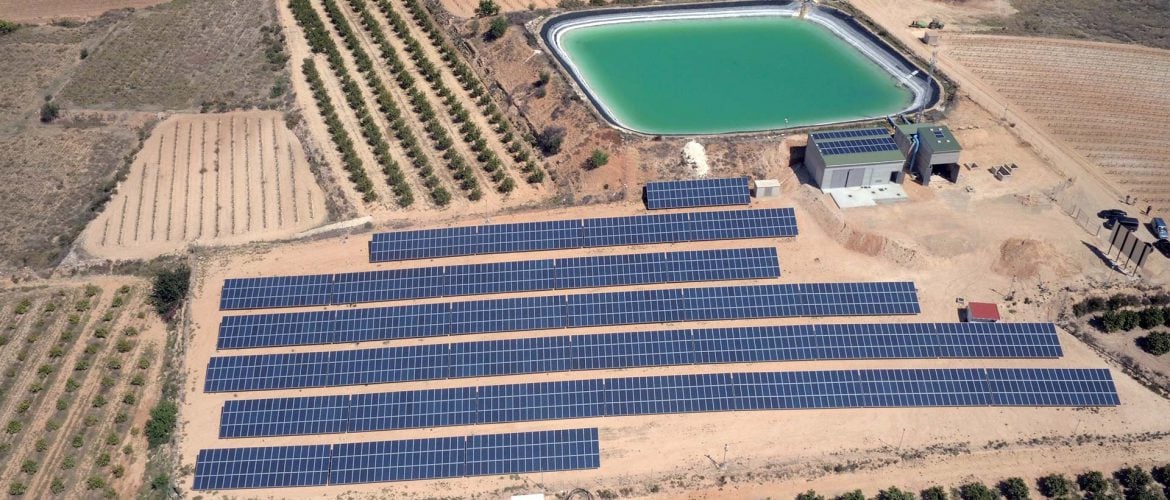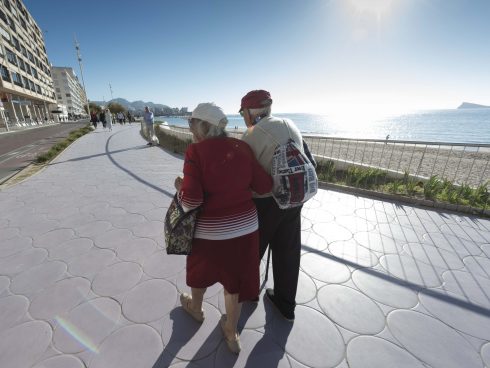IT was described as ‘the first and only solar extracting and pumping station in Europe’ and, from the moment it was operational, it was a game-changer.
The village of Godelleta was rightfully proud when it was selected in 2016 as the trial site for an innovative sun-powered system to pump and distribute water for irrigation.
The local agricultural community witnessed some remarkable improvements and, with water being used more efficiently, the citrus, olive, and vine yields improved and job opportunities increased as a result.
Thanks to batteries, the pump systems were able to operate at night and even on cloudy days, and, by reducing the village’s reliance on non-renewable energy sources, carbon emissions were reduced. It was a win-win scenario . . . until now.

The dynamics of a solar pumping system are both pioneering and simple. Photovoltaic panels convert sunlight into electricity. The electricity powers a control panel and pump, sunk into a water source, which could be anything from a river to a well.
Water is then transported along a ditch or pipe, or, in Godelleta’s case, an ancient system of acequias (canals) first installed by the Moors.
The delivery is preset depending on irrigation requirements – it might be drip method, full flow or half flow, for example. A timer, and water pressure, level and volume, can also be preset.
Godelleta is perched on the flat table of land above the citrus farms some 40km from the city of Valencia, and below the olive groves and vineyards on the higher land to the west towards Cuenca.

The town’s farmers are able to produce the crops grown in both areas (oranges comprise 40% of the total, grapes another 40%, the rest dominated by olives and persimmon), and the solar extraction system has been able to handle the varying irrigation requirements. For the most part the community has been happy with it, and proud to be a living, breathing example of sustainability and environmental responsibility.
However, plans have been announced for expanding the project. The company behind the scheme intends to increase the number of solar panels tenfold to 91,000. Around 10 times the amount of land currently used for agriculture would be swallowed up, and a labyrinth of pipes installed underground to transport water.
Furthermore, excess electricity produced by the massive solar fields would go to a substation serving other municipalities.
The massive size of the project will change the official classification of the project from ‘community scale’ to a ‘utility scale’, supplying electricity to the grid.
The debate over the arrival of giant solar farms and the ‘industrialisation’ of the countryside is not unique to Godelleta.
The Olive Press has discovered that at least 180 farms are currently proposed for the Alicante province alone, while around 1.2 million (yes, million!) hectares are currently being developed across Andalucia.
Multiple protest groups have been set up by locals in Andalucia’s famed ‘white villages’ – including Gaucin and Ronda and in the Genal valley – to fight the plans they claim will irreversibly destroy the unspoilt natural beauty of the area.
Some of them have been winning, with a number of schemes around Ronda, at least, officially being turned down for planning, although protesters are taking nothing for granted, as we reported in December.
Over in Teruel, in Aragon, it is estimated that an incredible 10% of the entire province could be covered by renewable energy projects by 2030.
Back in Godelleta, a series of public meetings regarding the megaproject of additional solar fields has begun and people have been expressing their concerns.
The villagers talk about being ‘buried’ under ‘a sea’ of new panels, and worry about the possible ‘expropriation’ of 375 plots currently used for agriculture. One told the Olive Press, asking not to be named for fear of reprisals, that the area ‘will be ruined’.
“Our economy has been based on agriculture for centuries, and to lose that would be to lose our dignity.
“For centuries Arabic acequias have been the tiers of cultivation that have fed our children with the fruits of the land.”
Although the example of Godelleta is a sample size of only one, the sentiments expressed by the local community tell the larger story of the unintended consequences endemic in the march towards clean energy. Stay tuned.
As the ‘industrialisation’ of solar power becomes ever more controversial, Jack Gaioni looks at how one small farming community was grateful for the installation that helped them pump water round the fields more efficiently – until the company announced plans to expand it tenfold
READ MORE:
- Jack Gaioni explores the horrors of a Civil War concentration camp and Franco’s grip on the Spanish press
- Meet the last shepherds eeking out a living on Spain’s ancient pastoral routes
- Wind of change: Two sides of the ecologist movement clash as Spain debates renewable energy
Click here to read more Jack Gaioni: Jack's Corner News from The Olive Press.








